Slab City 3: The Hippie vs The Gangster.
When capitalism came to the Last Free Place it sparked a spat that became a battle for the city's soul.
(Hi there, I’m Sanjiv and this is Minority Report, a newsletter about subcultures and fringe groups. This is the third and final post about Slab City, the quintessential American subculture. I recommend you read the first two, particularly the first, Slab City 1: Ask The Dust, and Slab City 2: “We’re All Here Because We Ain’t All There.” This is a story about how capitalism creates gangsters, how they use fear to silence their opposition, and what it takes to stand up to them. Sound familiar? If you appreciate reporting like this, please like/share/subscribe.)
—
“Greed Came To The Slabs”
Here she comes to greet me at the gate, waving merrily in her sunhat and shorts. Valerie Sherrill, 62 years old and beaming. “Welcome to the Sanctuary!”
Val’s an idealist, a Utopian. A glint of mission in her eyes. I met her on the Slab City Reddit and she invited me to come and stay in her guest hut, the one with the Thoreau quote daubed on the side: “Wealth is the ability to fully experience life.” She gives me the tour, explaining as she goes how she’s lived at this spot for a decade now, but at the Slabs for over twenty years. It appeals to her hippie spirit—the freedom, the art, the blank canvas of it all. You can build what you want here, be who you want, and escape the corporate rat race of Babylon. In fact this place, this camp in particular, gave her purpose and meaning and a new lease on life—hence the name, “The Sanctuary”. (We’ll get to that story in a minute.)
There is, however, a shadow to this picture. On the one hand, she has found her calling—she’s created the Sanctuary as an intentional community, a radical experiment in conservation and recycling, an effort to live in harmony with nature. This is Val’s spiritual practice. She loves talking shit, quite literally—how human waste can be repurposed to generate life. For a good hour, it’s all septic systems and composts and blackwater and how fruit trees block pathogens, but not vegetables. Her outhouses, she says, are the cleanest in the Slabs.
“I don’t believe there’s any such thing as waste,” she says. “I'm working within the cycle of life. Human presence should enrich not degrade!”
But as we walk, we keep passing a burned-out trailer in the heart of her camp. Slab City is full of charred wrecks, it’s easy to tune them out, but this one’s different. Val could haul it off if she wants, but instead, she keeps it center stage, like an exhibit.
“That’s from when I survived an attempted takeover from my neighbor,” she explains, pointing over her shoulder. “Yeah, they tried to burn me out. They wanted to steal my camp, but I decided to fight back.”
In the evenings, the lowering sun often glares through the trailer’s blown out windows and casts a long, splattered shadow across Val’s camp. It’s a symbol now, a dystopic centerpiece amid all her Utopian striving. A reminder of what she’s endured, how she’s changed, and how the Slabs have changed her.
“Twenty years ago, this was an amazing place,” she says. “It was all hippie snow birders, a lot of ex military. You could put a row of flowers or tin cans around the edge of your property and say ‘this is my camp’ and nobody would bother you. Not anymore. Greed came to the Slabs. People starting charging to stay and there were illegal bars all over the place. Things got bad.”
If you’ve read the first in my series on the Slabs, you’ll know that the Last Free Place in America is a free campsite, where everyone’s a squatter. And as such it has always operated in the margins of the law, that murky grey area between frontier justice and the police, where mobs muster, trailers are burned, and people are run right out of town… or worse. Val’s right when she says things got bad. Murders are on the up, guns go off even in the morning, even in the library, like trailer park Cluedo, and rumors persist about a spate of unsolved beheadings.
In the scheme of things, then, Val’s burned out trailer doesn’t even make the front page. But it does tell a story about the tension that underpins this place, particularly in this age of influencer tourism. After all, Slab City is a famous rebuke to capitalism, it was never meant to be a place of business, a profit center. And now that it is, something has been loosed, a nascent gangsterism that has emerged in the Scarface sequence—first the money, then the power.
And, from what I’ve heard all roads lead to one of Val’s neighbors, a hard-drinking, gun-slinging Airbnb owner whom I’ll call Evie (not her real name) the wannabe Swearengen of the Slabs.
Evie, The Swearengen of the Slabs
Evie wasn’t the first to charge visitors to stay at the Slabs. There was the Slab City Hostel across the “street”, and the Cafe Ponderosa, both of which offer rooms, at the basic end of basic.
But Evie offered something different—a campsite, a place to park your RV, or pitch a tent and access some water, some wifi, all for about $25 a night. And you’ll be safe, this is the main draw. Because the Slabs can get dodgy after dark. If you were to just show up one day and camp on a spare patch of land, then there’s a decent chance your RV would be robbed while you were out at the Range, say, the music venue in “town”. What Evie promises is someone to mind your stuff. Peace of mind.
To Val, however, this is laughable. Like mistaking an arsonist for a firefighter. And Val’s not the only one. Same goes for Marty, the biker. Remember Marty from the second installment? He went to prison for murder, became a Buddhist and swore an oath of non-violence, and that’s why he has nothing much nice to say about Evie.
“It is common knowledge,” he says, “that she has put up the biggest thieves in her camp for nothing. She invites people to stay at her Airbnb and says ‘nobody will steal from you because I have all the thieves in my pocket! They don't steal from me, they steal from everybody else outside my area.’ That's basically how she operates.”
I spoke to Marty and Val, and also a burly older musician, a veteran Slabber who I’ll call Sam (not his real name). Sam, like Val, was robbed by Evie and her goon. And a consistent picture emerges. They all describe Evie as a small time gangster who has been trying to expand her Airbnb business by taking over nearby camps in often unethical, aggressive ways. She enlists the help of some of Slab City’s sketchier residents, many of them junkies who do her bidding for a few bucks or some gear. It feels apt to point out here that she’s a diehard Trump supporter.
There are many stories. Like the time she tried to take over the camp of a recently deceased musician named James, but Val showed up and squatted to stop her. The time she threatened an old man with a gun in the middle of the street, and Marty intervened, telling her “if you don’t put that gun away, I’m going to take it off you.” There’s also the rumor that Evie once borrowed a canine shock collar from Val and used it on a guy whom she locked in a cabinet.
And yet in public, Evie presents the opposite image. She offers free meals and charity to fellow Slabbers. Charity as a mask for her ruthlessness. She once ran a needle exchange which is how she made those connections with local addicts. And one of her closest cohorts and sidekicks is a former addict we’ll call Roscoe, who runs a soup kitchen there where he feeds the hungry. But Roscoe too, has a checkered reputation. He took over the kitchen by allegedly burning out the last guy. And he now calls himself the Sheriff of Slab City having led the charge on driving out a number of people who are said to be pedophiles.
“You know Valerie isn't the only person that had problems with Evie,” Marty says. “On the other end of Evie’s property, a guy called Paul got run out too. Roscoe was threatening to burn Paul out so they arrested him for making terrorist threats. And I don't know what happened to that case, but Roscoe slandered him left and right, called him a pedophile, which he wasn’t. Then he burned his camp down and took it over. How he didn’t get in further trouble, I don't know. There might be collusion with law enforcement. But people tolerate it because he’s providing meals. Behind the facade though, he's just like Evie, a bully.”
Why I Changed The Names
I looked at those charges against Roscoe and they were thrown out in the end. That doesn’t mean they lacked merit—cases get thrown out for all kinds of reasons—but it does show how he-said-she-said this all is.
Marty, Val and Sam seem like straight-shooters to me, but there’s an element of gossip here, Slab City scuttlebutt. That’s why I’ve changed the names of Evie and Roscoe here, and a couple of others too. I don’t want to shame or defame anyone, I have no axe to grind, and the last thing I want is to spark retaliation against Marty and Val. Or me. I don’t want to end up in a closet with a shock collar around my neck. I’m changing the names to protect the innocent.
I’m not telling this story to expose anyone. I’m writing this because the story is irresistible. It’s familiar and mythic and utterly American. A microcosm, a Russian doll—a dispute between neighbors that became a fight for the soul of Slab City, which in turn describes America in 2025. I mentioned Swearengen earlier because it reminds me of Deadwood in its broad strokes, if not its specifics—the Wild West aspect, the ‘gold rush’ of tourism, the greed, the territorialism. There’s something about how the profit motive has corrupted the so-called Last Free Place, how it awakens our base instincts, our thirst of power and control. It feels like the birth of capitalism and the death of capitalism at the same time.
This is how stories work, they have patterns and arcs that recur in different contexts. In his memoir, Life’s Work, the creator of Deadwood David Milch writes that the show he first pitched to HBO was about the apostle Paul arriving in Rome to spread the revolutionary gospel, and the mighty shake-up that followed. HBO turned it down because they’d just commissioned a story about Rome, but these were the days before TV execs were replaced by tech bean counters, before art became content, so the execs asked him if he could set the same story somewhere else. And Milch picked Deadwood, South Dakota.
“There’s a fancy term called metempsychosis,” Milch writes, “which is the transmigration of spirits, reincarnation. Being able to see the same spirit moving in different places, different settings, different people and stories. That’s one of the blessings of art.”
Sanctuary Val
Val’s story starts in the hills of Appalachia where she grew up learning to hunt and fish. A country girl. Her father taught her to build, her Native American grandmother taught her herbalism, and she joined the Search and Rescue teams there for a while, before joining the military to get her degree paid for. Rural families from the south have long seen the forces as their ticket. She joined the marines and became a field radio operator.
The Marines sent her to 29 Palms for training, near Joshua Tree. She’d always wanted to come to California, to escape the culture of Virgina—the racism and sexism and homophobia. After 29 Palms, she was moved to Camp Pendleton where they sent her on field ops at the Chocolate Mountains, the range that abut Slab City. It was her first encounter with this off-grid community. Curious, she went to camp there in her off time, and found the Slabbers to be a “kind, jovial, innovative people, with very few addicts or drunks. It was safe then.” She met Leonard Knight, who was creating Salvation Mountain, and was inspired by him to stay there a while. “He taught me that even nomads need community!”
After the military, she would visit the Slabs periodically. At the time she lived out of San Diego County where she worked as a grant writer for schools and non-profits and then ultimately the EPA, which her hippy heart loved. But she travelled widely, camping through the desert communities in the South West, and staying on and off at the Slabs. She had a couple of kids, got divorced and moved up to the Pacific Northwest, to the woods of Washington State.
All was well until she became horribly sick. She was out raking gravel one night on her property, but when she woke up the next day, her hands and feet were numb. At first the doctors diagnosed her with MS, because that’s what they expect up there—MS is up to 3x more prevalent in the PNW than others part of America, for reasons that are not fully understood. So doctors tend to diagnose it and treat it, and if the treatment isn’t working, they up the meds. That’s what happened to Val, and it brought her to death’s door.
She was prepared to die. Plans were made. She gave away part of her house, divided her money and gave it to her children. Then purely by chance—or, as Val calls it, an answer to her prayers—a woman visiting the patient beside her at the hospital recommended her to a doctor in Mexico who had healed someone with similar symptoms. And what do you know? It turned out she didn’t have MS at all. It was heavy metal poisoning. She’d been eating shellfish, as one does in Seattle, but they were full of copper from the flaky paint they use on boat hulls in the harbor. That copper had settled in her spine and it was killing her. What she needed was to detoxify completely.
So Val retreated to the woods of Washington to nurse herself back to health. She was alone this time, on a full raw vegan diet, in a private cabin in the forest. Extreme measures. She withdrew from technology, from television, radio, all of it. And she meditated, grappling with her monkey mind for a whole year until, as she puts it, “there was nothing left, but peace and gratitude and being in the present moment.” She was talking to trees. Eating wild berries at dawn. Chancing upon cougars and bears on her forest walks and thinking, “this is the way we're meant to live.”
In the end, it was the weather that forced her out of the woods—one snowstorm after another until one day, she left the dishes in the sink and flew back to the sunshine of Southern California. And then ultimately back to the Slabs, that blank canvas where she could start again, and realize her dream of being at one with nature. It was 2002.
“I came to this patch right here,” she says, wistful at the memory. “And you know what I did? I sat amongst the bushes and I asked permission to be here. I had a vision.”
Not a vision of Jesus, or some Native American shaman, oh no. A vision of a sewage system. “I could see it! A drip-line trench!”
Living With The Enemy
That was 2015. And it was all going great until about 2018. She was healthy now, glowing from all the raw fruit and vegetables, and also from that warm sense of personal virtue that accompanies recycling.
She was learning the ukulele and playing at the Range. She felt like a child again, it was lovely. And her camp, The Sanctuary, was growing. She had hired a caretaker named Billy for the summers, someone who could watch the place if she headed out of town (she would often head back up to Washington to help out an elderly friend up there). And that’s what Billy did for a couple of years. It was nice to have this affable Yosemite-Sam looking guy around to help out.
Then they started dating. Billy had been knocking at the door for a while, but Val had kept him at bay, “I don’t shit where I eat!” But then someone close to her died. “I was vulnerable,” she says. “And yeah, I broke my rules and I got involved. And I saw right away that he had an edge. He lost his temper and I could see he was controlling type. But I don’t know, I think I had a kind of Pollyanna mindset, you know, that it would be OK, we were adults, we’d work it out. So when he said, ‘we should get married. We’re living together anyway, and that way I can be on your health insurance, just in case.’ Well, I fell for it. He talked a good game! And as soon as we got married, I realized he was a con man and a felon. It was… terrible.”
Meanwhile capitalism was coming to the Slabs in a big way. Through 2019 to 2020, a number of Airbnb businesses opened, as well as illegal bars where you could buy drugs over the counter. New unsavory characters came flooding into the Slabs. And then came Covid and social distancing and the social fabric began to fray even further. Crime went up. Drugs. Greed.
Billy began a campaign to take over Val’s camp just a few months after they tied the knot. His plan was to sell it to Evie, and he did everything he could to drive Val out. He drained her water supply and killed her trees. He stole her generator, her solar panels. He disabled her truck. She was living with the enemy. But it was the assault that changed everything. He beat her up in her own camp, busting her lip and forcing her to flee in the night and hide out near the hot springs.
She fled to Washington state at that point. She had a facial twitch, chronic diarrhea, her hands were shaking, all of it stress related. As a veteran she already struggled with PTSD. It took months of therapy to overcome the physical symptoms.
But then she came back.
“I feel like I'm divinely guided to be here,” she says. “Like I am working from my highest intention, not for profit, not ego. If it was just for me, I wouldn’t fight. But I’m standing up for the plants, the animals. People who come and want to learn how to live out here.”
Sanctuary Val vs Evie
She moved back into the Sanctuary and stood her ground. She filed a restraining order, which further enraged Billy, who would violate it and get arrested. But so long as they were married, he still had a claim to her property even though he couldn’t set foot on it.
So he gave permission to Evie to come over, with the rabble of addicts that she surrounded herself with. And between them they arranged for a couple of the most notorious thieves—let’s call them Snoop and Juno—to live in the trailer that Val had provided for him. The one that’s now burned out in the middle of The Sanctuary.
It was Snoop and Juno who burned the trailer, as a warning to Val of what might follow if she stuck around. Val was in her main “house”, watching it burn, but still standing firm and refusing to leave. Think of the courage. To be a woman in your late 50s, living in a squatters encampment in the desert, stalked by a violent ex, a neighbor who wants your property, and a pair of feral junkies in your front yard, brazenly stealing from you, loading up a pick up truck that Evie loaned them for the job. All the while, Billy and Evie are out in the community telling lies that Billy was in fact the rightful owner of the Sanctuary, not Val. That Billy, the beer-bellied felon with the temper, he was the true founder of the spiritual eco-retreat.
There weren’t many at the Slabs who dared to stand with Val against Evie and her goons. As “Sam”, the gruff old musician who had also been robbed by Snoop and Juno, told me:
“It’s like what’s happening with the current administration. People don’t want to stand up to the bully because they’re afraid of becoming a target.”
But Val did find some unexpected allies in her battle.
“I’ll never forget the man who came over and told me that he would kill Snoop and Juno for me if I said the word. I was very careful in what I said. I couldn’t tell if he was recording the conversation or what. And it could have just been big talk. Half the time you can’t believe what people say at the Slabs anyway. But Juno was hiding out and she heard the whole conversation. I haven’t had any trouble from them since.”
That man is still at the Slabs with his wife. They’ve become friends of Val’s, and perhaps that’s why Juno stays away. But Val had no trouble standing up for herself. She once caught Juno, the junkie thief who was on her property, defecating in a bucket, and Val kept it. She told Juno, “I’ve got your DNA now, so don’t mess with me, or I’ll put your DNA on the next body that shows up at the Slabs.” A poetic counter given Val’s mission to make the most of human waste!
Through all of this, however, Billy continued living at the Slabs and fighting her at every step. Though they finally divorced in 2021, he tried to go after her military pension for spousal support, and in the end, it cost her $30,000 to be rid of him, which she had to borrow, by the way. Of course Billy blew through it. Then, he got involved in an robbery in New Mexico, and served yet more time for that, and then a parole violation, and then… you get the picture.
“But now he’s back,” Val sighs. “Where else do you go if you’re a felon? He’s right across from me.”
And Evie?
“Oh I’m sure she’s just waiting for something to happen to me so she can move in and take over. But she knows I’ll stand up. I’m here to stay.”
The Tree-Hugger Turns To Guns
Val’s looking at the trailer against the pink sunset.
“I want to make art out of it. Doesn’t it look like a crashed airplane? Put half a wing here and maybe some palm structures, you know, like an island. I’ve talked to some artists already.”
Slab City has survived a lot of changes over the years. The rise of Evie has been stemmed for the time being, partly by Val’s valiant stand, but also by infighting among the junkie posse that Evie has assembled around herself. Snoop and Juno are no longer friends and both have become sworn enemies of Evie’s—over money, over who ratted who out. Grubby, criminal squabbles. But capitalism continues its march, and the profit motive has become central to the Slabs identity now, in a way that has arguably changed it forever.
But Slabbers are a resilient lot. After all, they live in the desert with no utilities. “Sam”, the gruff old musician who had been robbed by Snoop and Juno, told me that “there’s something bulletproof about this community. We just carry on. We adapt. We always have.”
It’s frosty, of course, between Val and Evie these days, but there’s a détente at least. And Val no longer spends her days in fear. Lessons have been learned.
“A friend sent me his pistol through the mail, and honestly, the first night I slept with it beside my bed was the first night’s sleep I’d had in a while,” she says. “That’s when I decided, I’m only a conditional pacifist. Yup, that’s what happened here. They turned a tree-hugging hippie to guns!”
She’s begun to teach shooting classes at the Slabs. She’s always teaching, Val—if it’s not yoga, it’s how to get water from the canal, or build a composting toilet. And her students are typically women.
“We call it the Slab City Vagina Alliance,” she says. “Basically, if you need something, ask a woman first. Because if you ask a man, he now feels like he has the right to come into your camp.”
So lately, she’s been heading into the desert with her class and training them to shoot both a rifle and a pistol. “The pistol’s easier because a lot of women or petite men don't have the strength to pull back the slide on an automatic.”
It’s a good time, a blast even. But the stakes here at the Slabs are all too real. Don’t be fooled by the hippy Val with her sunhat and smile, strumming her ukulele.
“I’m not training people to kill or anything,” she says. “In fact, I always tell people that it’s better that you kill somebody with a hammer because a gun looks premeditated. But a pistol does help you feel safe. That’s really what this is about. Oh look!”
She’s pointing at a bush behind me. “I think those are carpenter bees!” she says, full of joy. And instantly, the whole story about Evie, Snoop and Juno and her poisonous ex Billy, they all recede into the past. “You know, that bush used to have no blooms because it only gets pollinated by carpenter bees, not the usual apis honeybee. But we get both here now! It’s just beautiful! That’s when you know you’re on the right path…”

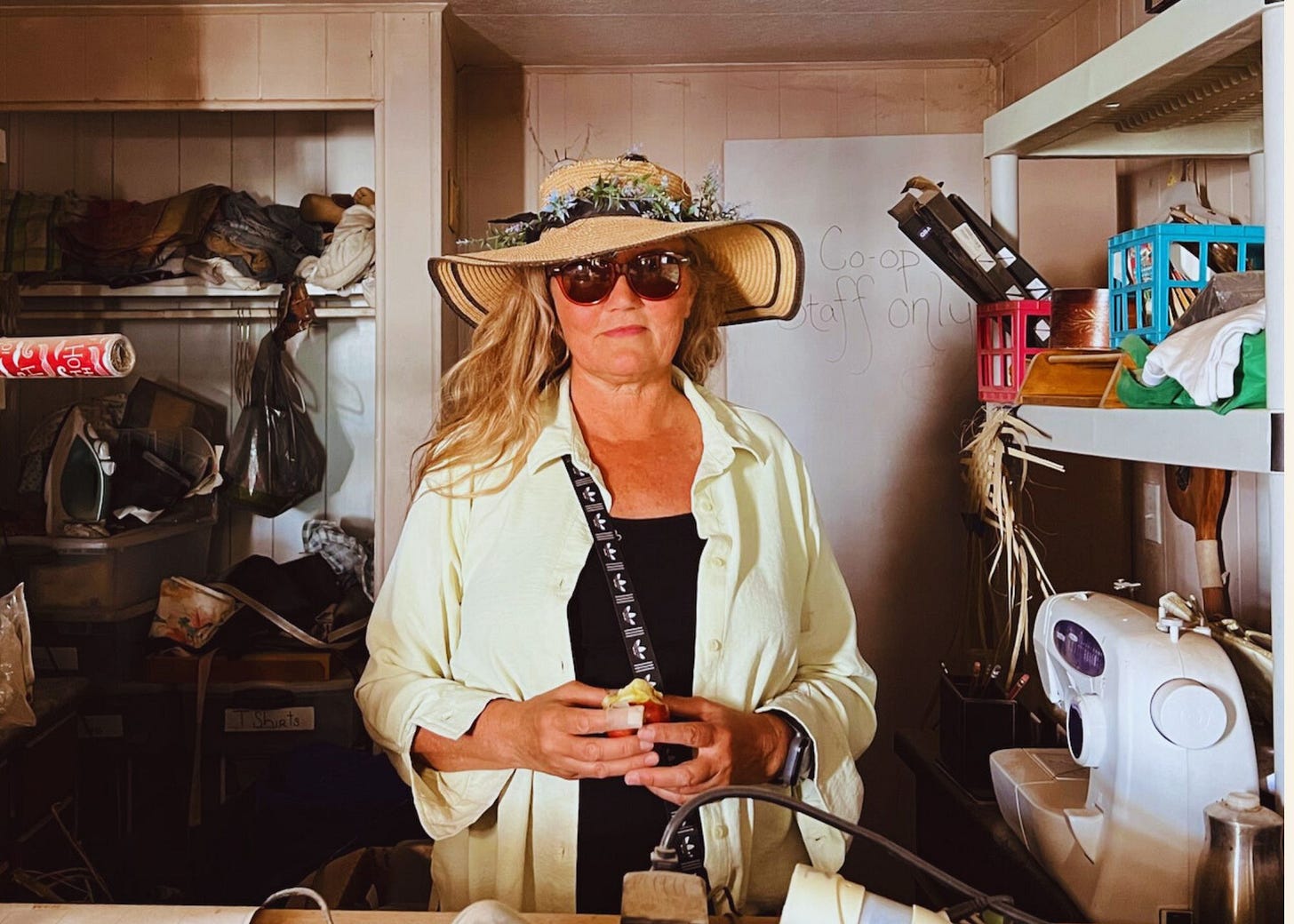
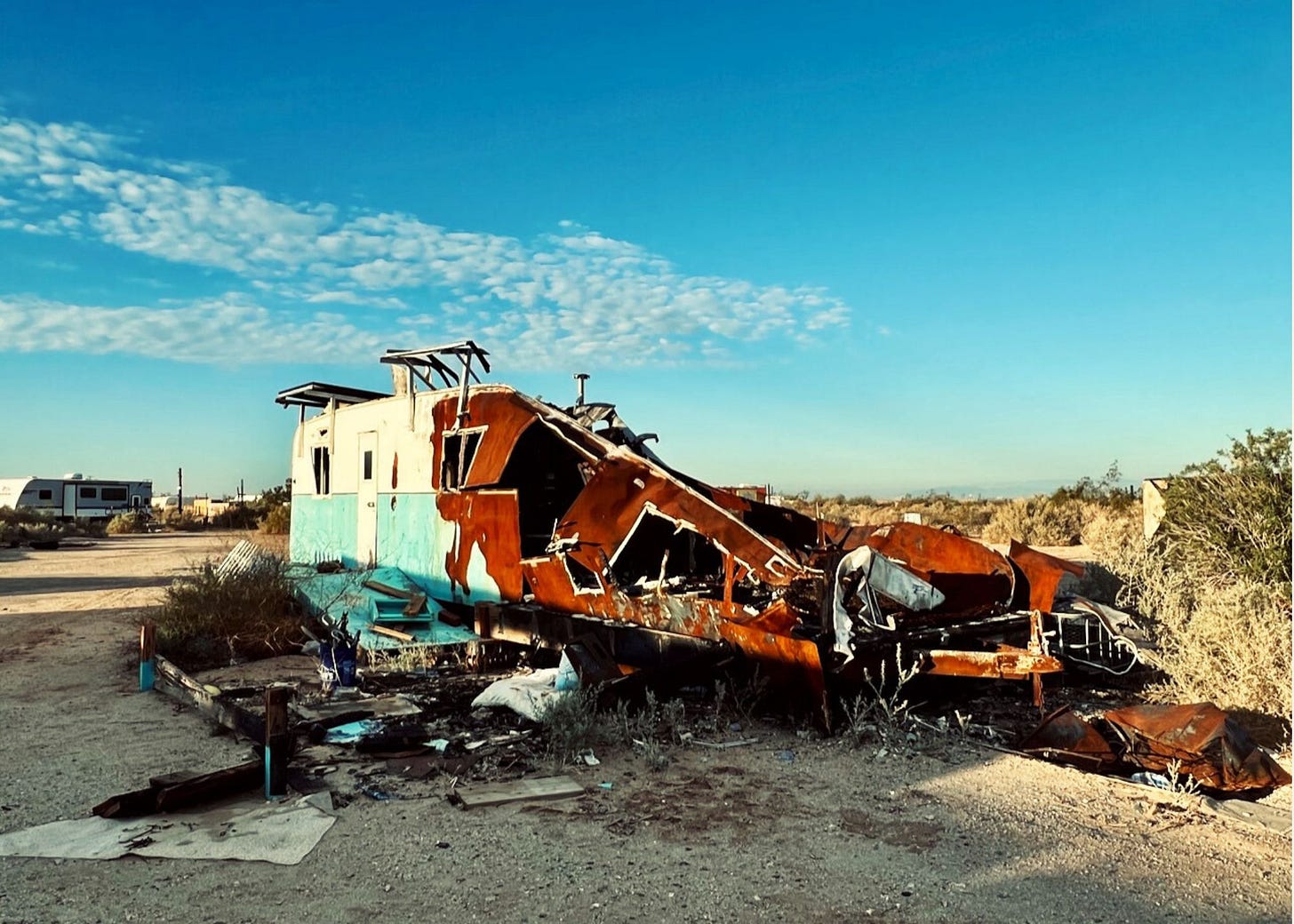

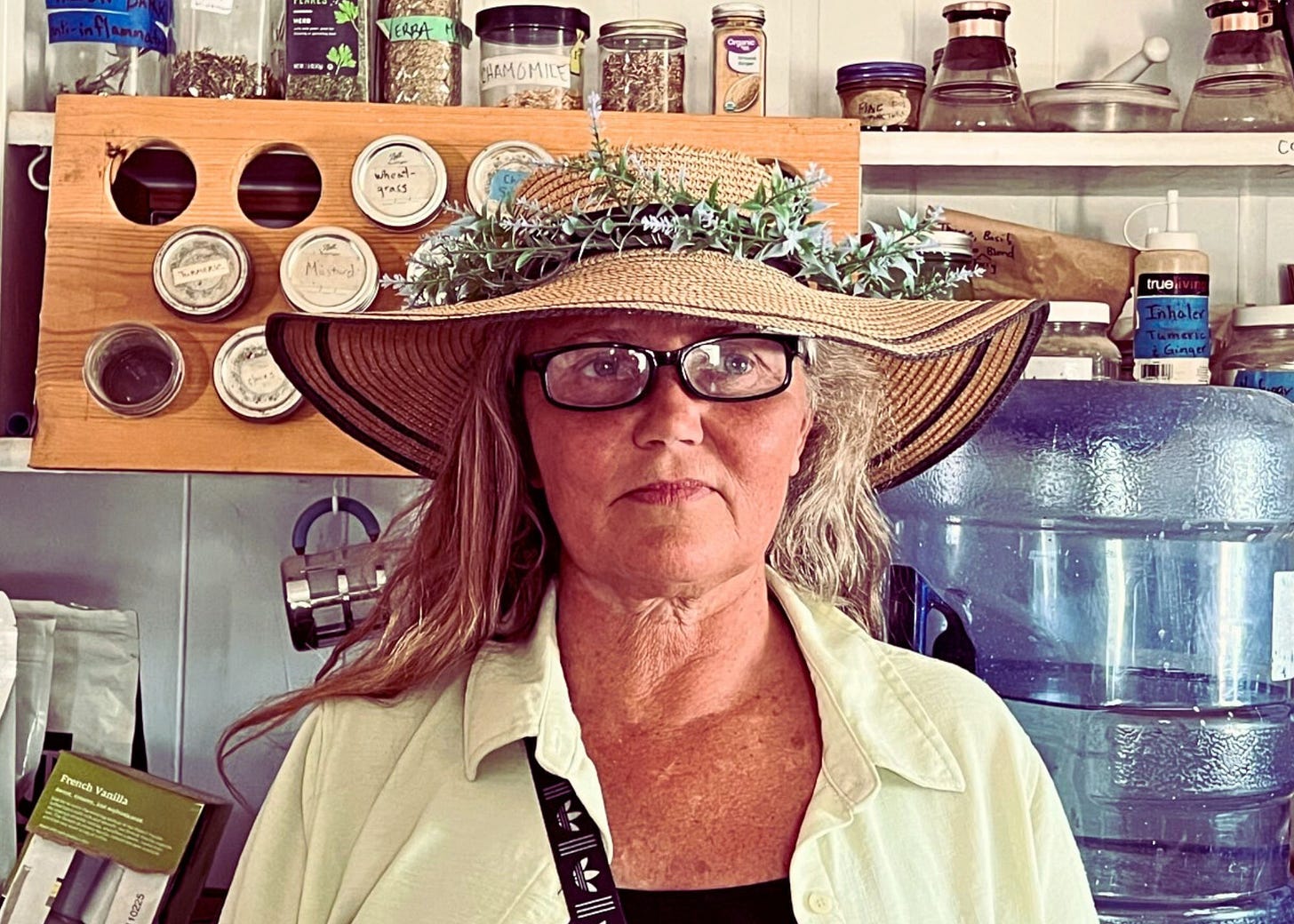
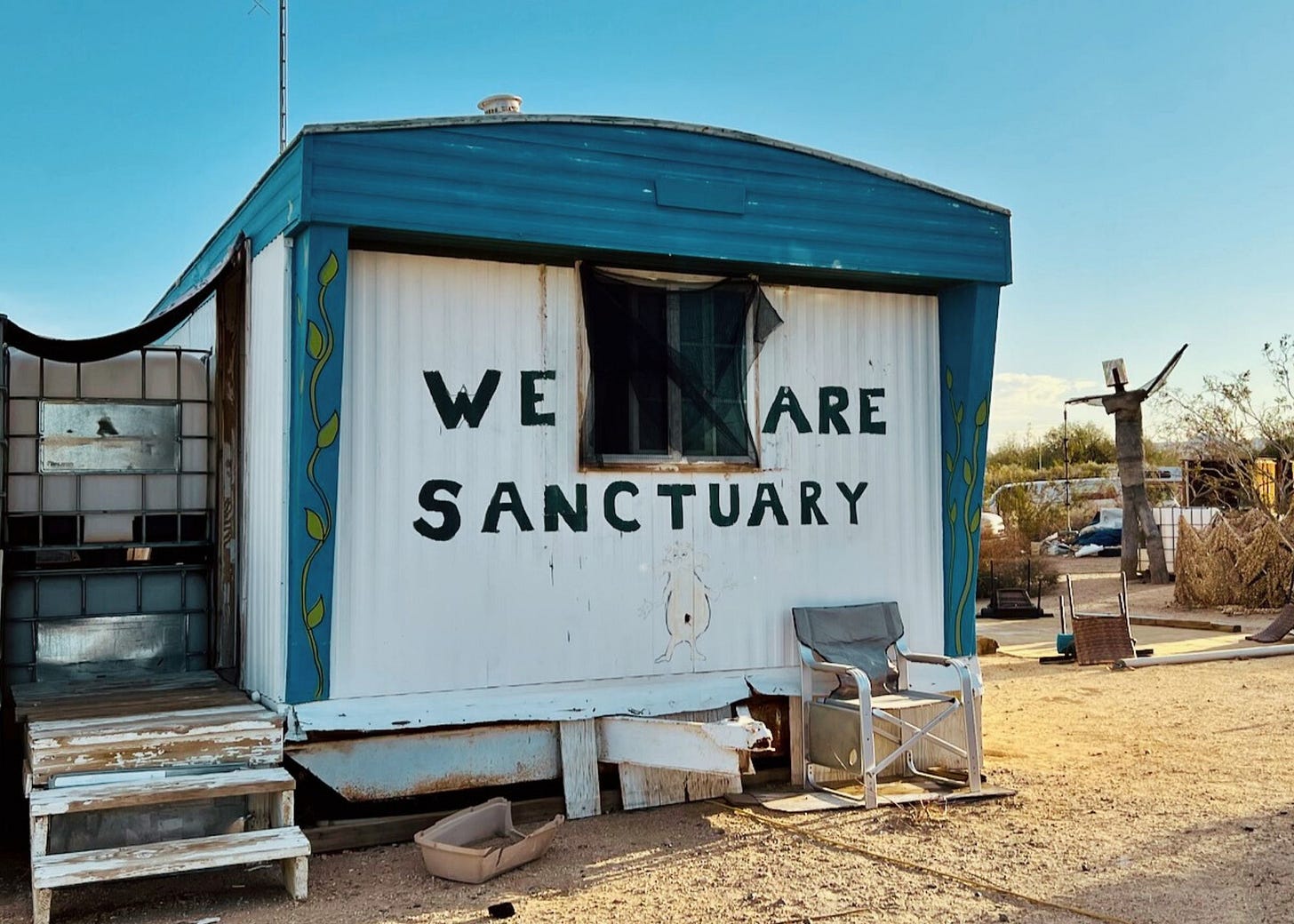

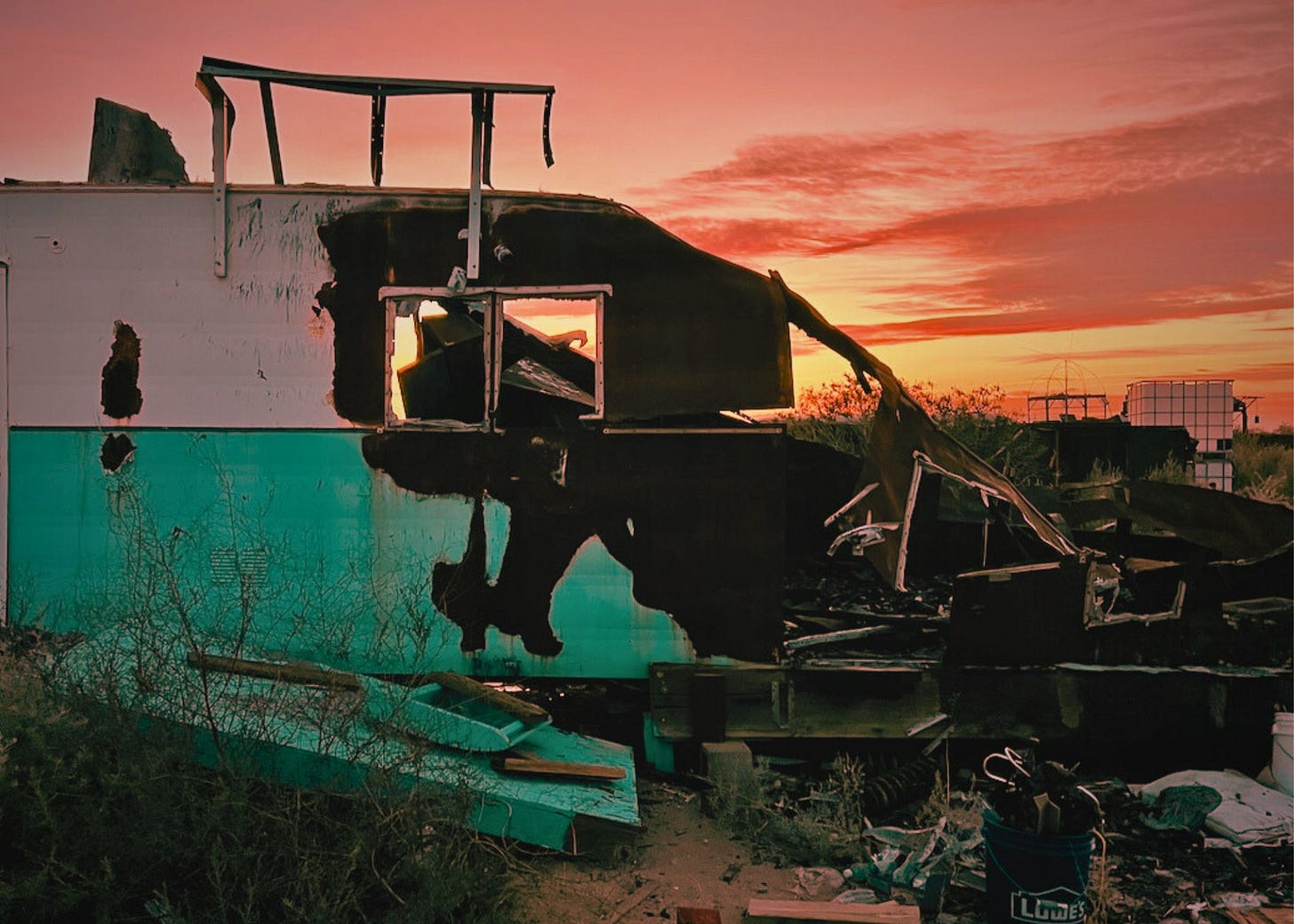
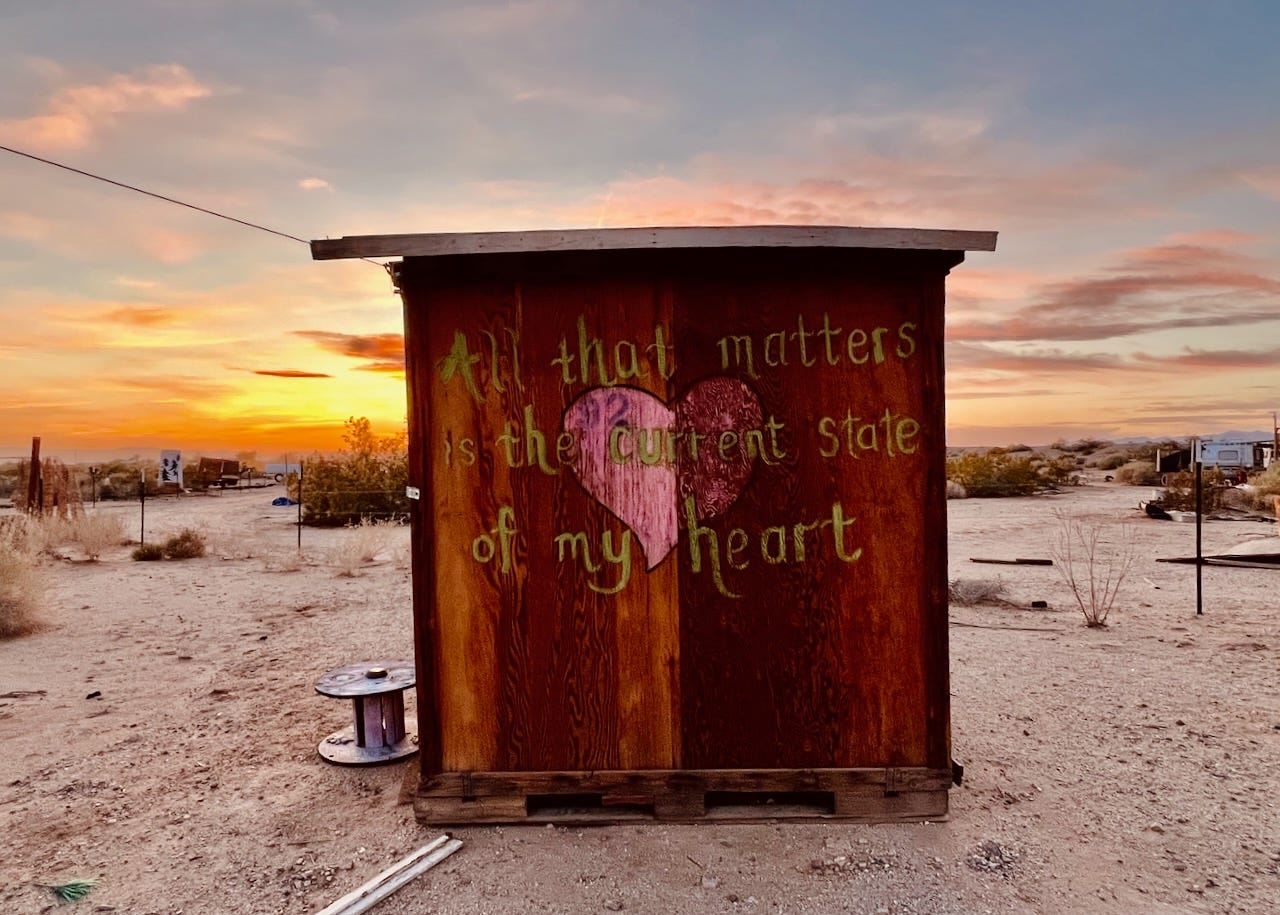
Sanjiv, you find the edges of the edges. And this place is a microcosm of the USofA now.
Absolutely incredible read!!